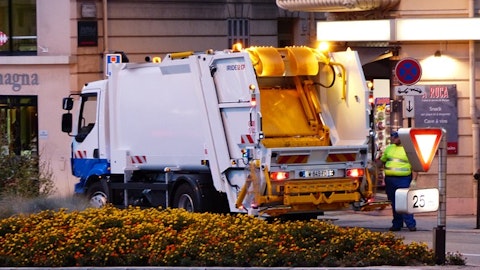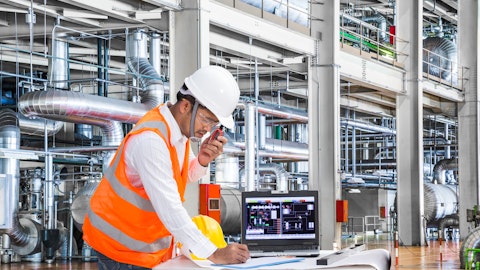Solid Power, Inc. (NASDAQ:SLDP) Q4 2022 Earnings Call Transcript February 28, 2023
Operator: Greetings. Welcome to the Solid Power, Inc. Full Year 2022 Financial Results and Business Update Call. Please note that this conference is being recorded. I will turn the conference over to your host, Jennifer Almquist, Investor Relations for Solid Power, Inc. Thank you. You may begin.
Jennifer Almquist: Thank you, operator, and thank you, everyone, for joining us today. Joining me on the call today are Solid Power’s Interim Chief Executive Officer, President and Chairman, Dave Jansen; and Chief Financial Officer, Kevin Paprzycki. A copy of today’s press release is available on the Investor Relations section of Solid Power’s website at ir.solidpowerbattery.com. Before we get started, I’d like to remind you that parts of our discussion today will include forward-looking statements as defined by U.S. securities laws. These forward-looking statements are based on management’s current expectations and assumptions about future events and are based on currently available information as to the outcome and timing of future events.
Except as otherwise required by applicable law, Solid Power disclaims any duty to update any forward-looking statements to reflect future events or circumstances. For a discussion of the risks and uncertainties that could cause actual results to differ materially from those expressed in today’s forward-looking statements, please see Solid Power’s most recent filings with the Securities and Exchange Commission, which can be found on the Company’s website at ir.solidpowerbattery.com. With that, let me turn it over to Dave Jansen.
Dave Jansen: Thank you, Jen. Good afternoon, everyone. I appreciate you joining the call today. I am excited to speak with you following a busy first few months in the interim CEO role. For those who I haven’t spoken to yet, I’ve been involved with the Company since it was founded, and as President and Chair, I’ve worked with leadership on developing our strategy, business and team. Today, I will start with an overview of our ’22 results. I will then touch on our business strategy and provide my thoughts on the year ahead. Then I’ll pass the call over to Kevin for a review of the financials. After that, I’ll provide some concluding remarks and open the call for questions. 2022 was a very successful year for Solid Power. I’m proud that our team delivered on a number of key milestones, and I continue to believe the Company is well positioned for long-term success.
Our 2022 objectives were aimed at building the foundation for scaled electrolyte production and cell development. To accomplish this, we first invested in key production capabilities for electrolyte powder and EV cell manufacturing. We scaled and manufactured cells on the EV line. We deepened relationships with our partners. We secured funding for key R&D efforts. And we built an effective public company platform. Looking at these a little more closely. First, our electrolyte production facility and EV line will play an important role in the next stages of development as we support automotive qualification and work towards commercialization. Second, we delivered both 2 and 20 amp-hour cells to our partners, and the feedback has been encouraging, and as we discussed last quarter, led to our customers to confirm additional orders for our 20 amp-hour cells.
We also produced our first EV cells, which I’ll touch on shortly. Next, we deepened relationships with our partners. In December, we expanded our relationship with BMW. In addition to increasing development resources during a tight labor market, this paves the way for potential sales of electrolyte once BMW’s pilot lines are up and running. This arrangement also lets us work closely with BMW on pack level requirements and vehicle integration. This positions ourselves to power a BMW demo car, which we think would represent an important proof of concept. Further, our relationships with Ford and SKM also remains strong as we continue to work closely with them as well. Also, this being our first year as a public company, we developed a great Board of Directors and hired key personnel to build a strong public company foundation.
Again, I’m very proud of our team’s progress in 2022 and want to thank them for their continued dedication and hard work. I would now like to take a moment to summarize our strategy. Our approach is unique for the industry and has not changed. Mainly, we see ourselves as a battery material supplier and technology company engaging in the development of advanced solid-state battery cells. We do not envision ourselves as a commercial battery producer over the long term, but rather, we will license our cell designs and intellectual property. This is by design. Battery manufacturing is capital-intensive, competitive and margin-pressured. And it can take decades to develop the manufacturing expertise needed to compete as a battery producer. To be clear, we currently and we will continue to design and manufacture ourselves for development purposes.
We have a great team focused not only on developing our current EV cells but also on next-generation cells, including our nickel- and cobalt-free designs. Thus, our intention is to supply battery manufacturers with our materials rather than compete with them on cell manufacturing. This can open up a much larger market for us as we can supply our electrolyte and work with anyone taking a sulfide-based approach to solid-state batteries, whether they use our cell designs or not. We believe sulfide-based solid state is the best path for EV applications due to its potential for wide temperature performance and manufacturability. There currently are a limited number of sulfide electrolyte producers, and all are at the R&D scale. Given the lack of commercial production and the potential benefits, we believe we can capitalize on the growth of these technologies.
We believe our electrolyte can compete based on performance, quality, reliable supply and cost. As we start producing electrolyte from our new facility, we are also working on the next generations of electrolyte with a focus on conductivity, cost and performance. Looking ahead, 2023 will be another important year for us. Starting with our electrolyte, we are targeting two key milestones in 2023. The first is to commission and begin producing electrolyte from our new facility. All the equipment has been installed, and we expect validation to be complete by quarter end, if not sooner. Our new facility will have the capability to produce 30 metric tons of powder per year. The facility was designed to support cell development for the APQP process of our current partners.
However, we also expect to have additional production capacity for our other customers, which brings me to our second goal, to get our electrolyte into the hands of potential customers. We have engaged with potential customers and are making plans to deliver sample product. The intent is to pave the way for future electrolyte supply agreements. These sales would be independent of our current partner activities. We are excited about the opportunity for others to kick off the testing process of our electrolyte. Turning to cell development. We have two additional key milestones for 2023. First, continue to improve key cell performance metrics, including energy density, pressure, cycle life, low temperature operation and safety. We have delivered hundreds of 20 amp-hour cells to our partners and have seen some good results, and some that are more challenging as our first batches are being tested.
We said on our third quarter call that initial production was impacted by quality issues and some input materials, delays in material availability and tightening in the labor market. Our yields were lower than expected, which combined with the significant increase in demand of 20 amp-hour cells resulted in us spending more time anticipated on 20 amp-hour builds. I’m pleased to say that the team did a great job of pausing, analyzing and identifying root causes to address these issues. This allowed our team to make design changes to improve manufacturability and identify enhancements in our manufacturing processes that we believe will benefit in all of our cell production. We also encountered mixed performance in our 20 amp-hour cell safety. We passed our UN/DOT certification, which is a gating test to start module and pack development.
However, it is taking longer to meet the positive abuse performance results that we saw in our two amp-hour cells. This is an area where our JDA partners have been incredibly helpful, and we are grateful for their expertise and support as we collaborate to clear this hurdle. Our second key cell development milestone for ’23 is to deliver EV cells to our joint development partners and officially enter A-sample. As a reminder, on our last call, we stated that we believed we could optimistically deliver our first EV cells by the end of December. But more realistically, it would be in 2023. We began production in October and believe later this year to be a reasonable target for EV cell delivery. Stepping back a bit and looking at our path to commercialization.
Our ’23 milestones are designed to support our overall time line. Successful execution is the key to driving value to both our partners as well as our shareholders. After we deliver A-sample cells and scale our electrolyte production, we believe we will have better line of sight into our commercialization path. And at that point, we plan to provide an update on our long-term time line. That said, we can share a few higher-level takeaways as we look at our time line. First, our overall schedule for starting electrolyte production remains intact, including prior delays. Our team did a great job of increasing our SP1 production to build inventory and avoid costly expediting fees. Second, we expect EV cell delivery in ’23. However, it could be late in ’23 if unexpected challenges arise.
Given our previous target was December ’22, this delay will impact our overall commercialization time line. More importantly, we are seeing market risk with respect to our overall commercialization time line. This situation remains pretty fluid. However, high-level communications from our partners and others have pointed towards the 2030s for the broader adoption of solid-state battery technology. This could represent a two- to three-year delay from our initial projections. Internally, however, we are still driving towards our goal of reaching commercialization by 2028. As a management team, we are being aggressive and creative in addressing and mitigating potential risks due to time line by working with our partners and leveraging their resources and expertise, pursuing electrolyte sales to companies who are not currently engaged in cell development with us.
And additionally, we have also begun discussions with new potential partners whose skill sets could accelerate development, though it’s too soon to say anything definitive. Before I turn the call over to Kevin, I want to highlight one additional accomplishment that occurred early in 2023. In January, we secured an additional $5.6 million in Department of Energy funding to continue our development of nickel- and cobalt-free solid-state cells. If successful, this technology could be a game changer in terms of both input costs and supply chains. It will likely be several years until it comes to fruition, but this technology is already on our product road map. With that, I will hand it over to Kevin to take you through our financial results. Kevin?
Kevin Paprzycki: Thanks, Dave, and good afternoon, everyone. I’ll start off with an overview of our financial results and then discuss our ’23 and longer-term financial outlook. Our ’22 revenue of $11.8 million came in ahead of our initial expectations. Our team, again, did a great job of delivering on program milestones, and we also saw the initial revenue from the new BMW agreement late in the year. ’22 operating expenses were $70.9 million, up from last year. These represent increased direct program costs on our higher revenues, increased labor and materials driven by the scale-up of our operational and development investment and investments in SG&A to support Solid Power’s ops teams and build out our public company platform.
Our operating loss was $59.1 million in ’22 and net loss was $9.6 million. Turning to our balance sheet and liquidity position. During ’22, we invested $33.8 million in operations. We also invested $58.3 million in CapEx, reflecting the installation of our EV line and the construction of our new electrolyte production facility. As expected, operational and CapEx spending were both favorable to our plan. This was due to the shift in timing on EV cell production and completion of the electrolyte facility. Combined, these shifted around $15 million in operational spend and roughly $25 million in capital spend from 2022 to 2023. During the fourth quarter, we also received $6 million from BMW related to our expanded joint development agreement. We ended the year with total liquidity of $496.1 million consisting of cash, marketable securities and long-term investments.
Looking ahead to ’23, as Dave outlined, our performance this year is important. The ’23 guidance we are providing today assumes we execute on these milestones as planned. That in mind, we currently expect that ’23 revenue will be in the range of $15 million to $20 million, inclusive of revenue from our BMW agreement as well as expected revenue from government programs. We currently expect our ’23 total combined cash investment to be in the range of $120 million to $140 million. That breaks down into $70 million to $80 million of expected operational investment and CapEx investment between $50 million and $60 million, which primarily represents the final build-out and start-up of our electrolyte plant. This leaves us with expected liquidity in the range of $355 million to $375 million.
Regarding the long-term time line from a financial perspective, we’ve begun to model our long-term cash burn should our commercialization time line shift. I want to point out that we are glad to have such a solid balance sheet. Our ability to manage our cash is really bolstered by our unique business model, which keeps our capital needs lighter than others in the battery space. Likewise, because we accelerated our operational and equipment investments, our annual spend in ’22 and ’23 is likely to be higher than our spend going forward. We’re also planning to be prudent with our investments and will match timing with what we’re hearing from our customers. While there is still work to be done, right now, we believe that our current cash, along with revenues we expect to take in from our government programs and current partnerships, will take us out into the late ’20s.
We have significant flexibility with our capital spend. And with the benefit of additional project finance or grant funding towards our planned SP3 mass production plant, it’s our view that we can run all the way to commercialization without having to raise additional cash. Again, this is a testament to Solid Power’s business model. With that, I’ll now turn the call back to Dave.
Dave Jansen: Thanks, Kevin. Before I turn the call over for questions, I want to briefly touch on one last item, our ongoing search for a permanent Chief Executive Officer. We are targeting individuals who can continue to drive the development and commercialization of our technology and have been impressed with the quality of people who are interested in the position. It is still too early to give a target date for any kind of announcement. However, we feel good about the team in place as well as our ability to drive things forward until we find a permanent CEO. With that, let’s open it up to questions. Operator?
Q&A Session
Follow Solid Power Inc. (NASDAQ:SLDP)
Follow Solid Power Inc. (NASDAQ:SLDP)
Receive real-time insider trading and news alerts
Operator: Thank you. Our first question is from the line of P.J. Juvekar with Citi.
P.J. Juvekar: Yes. Dave, question for you on your SP2 electrolyte facility. How much of your revenues in 2023 will come from the — say, from that facility? And what do you think is a demand for sulfide electrolytes either from your partners or from third party that you talked about?
Kevin Paprzycki: P.J., it’s Kevin. I’ll take the first one. Very little of our ’23 revenue will come from powder out of this new SP2 facility. So we’re not dependent upon this facility for any of our ’23 revenues.
Dave Jansen: What was the second part of the question? Sorry.
P.J. Juvekar: The second part of the question was, how is the demand looking for this powder from your existing customers and the new customers that you talked about?
Dave Jansen: Yes. Great question. So right now, we’re in the process of talking to our partners as well as new potential partners on looking at using our powder in their designs. We are at early stages of those discussions. We are, however, in more detailed discussions with our current partners. So I can’t really give you any guidance on revenues, but we are looking optimistically at going forward with those guys.
P.J. Juvekar: Okay. And last year, you talked about delaying your EV pilot line because of issues with scaling above your 20 amp-hour cell. As you ramp up your EV pilot line and deliver your first EV cell, can you talk about the technical specifications of that cell? Like is it a 50 amp-hour cell, a 100 amp-hour cell? What are the densities you’re targeting? Can you just give us some idea of what you’re trying to get at with this EV cell?
Kevin Paprzycki: P.J., it’s sort of dependent upon what our customers want long term. And so the EV cells could be anywhere from — we’ve seen in the 60 amp hours all the way up to the 100 amp hours. It’s probably long term going to be in the midpoint of that range is what we’re thinking. But again, things can change and they do change quickly as we work with our partners.
Operator: Our next question is from the line of Brian Dobson with Chardan Capital Markets.
Brian Dobson: So the expanded partnership with BMW is very exciting. What do you see as some key benchmarks that you think that you’ll need to meet there in order to further expand to that agreement?
Dave Jansen: Yes. We are really excited about the new agreement with BMW. It’s a natural progression since 2016 when we were working with BMW of having the next — taking the next steps forward of really working with BMW closely on the design of cells specifically for them, looking at things like pack integration, vehicle integration, those kind of things, and then actually having the BMW people on site helping us and learning about our design so we can move the technology forward. I can’t really say at this point right now what the exact parameters and whatnot will be, but that will be a main focus of our program going forward.
Brian Dobson: Well, we look forward to hearing more about it. You also mentioned some powder sample deliveries to potential customers. I know it’s early, but can you share any initial feedback that you’ve received from that?
Dave Jansen: Yes. We have a lot of interest. There’s a lot of entities out there that are exploring the sulfide solid-state battery space, and we’ve been in contact with a variety of those folks. And we’re in the process — excuse me, the process now of looking at sampling agreements, material transfer agreements, those kind of things, and getting the powder into their hands for them to test.
Operator: Our next question is from the line of Mike Shlisky with D.A. Davidson.
David Johnson: This is David Johnson on for Mike. I just want to get a sense for what the labor situation looks like. Do you have all the people you need to deliver on your 2023 goals at this point?
Dave Jansen: Yes, great question. Clearly, the labor market has been tight, but we’ve added — I think we’ve over-doubled our employees since last year. I think we’re about 240 people. We’re always looking for good talent. However, one of the key things about what we’re doing is — with our partners is we look at this as sort of a force multiplier. With our partners helping us and having BMW folks on site and those kind of things, those people can actually be a tremendous value to help us move the technology forward. And they have very relevant experience, domain expertise of the kind of technology that we’re developing as well. I think we feel pretty good about being able to move things forward and getting our goals in line for 2023.
David Johnson: That’s great to hear. Maybe a last one for me. Sorry if I missed it, but can you just give us a sense of the cash usage in the first half of 2023 compared to the second half?
Kevin Paprzycki: Good question, Mike. It’s probably skewed a little bit towards the first half of the year, the usage. And the primary driver there is, again, as we complete this SP2 facility, you’re going to see the capital spend — probably 2/3 of the capital spend is going to be in the first and second quarter with the remaining coming over the back half of the year. So cash usage is probably first half of the year. And I’d say probably middle half of the year is probably a little bit heavy for the operational investment because we’ve got a lot of development materials and things like that, that are going to hit them. So it’s probably first half-weighted in — by, I would say, 2/3 or so.
Operator: As there are no further questions at this time, I would like to turn the floor back over to Dave Jansen for closing comments.
Dave Jansen: Thank you all for joining us today. We really appreciate your attendance, and we look forward to updating you on our progress throughout the year.
Operator: Thank you. This concludes today’s teleconference. You may disconnect your lines at this time. Thank you for your participation.
Follow Solid Power Inc. (NASDAQ:SLDP)
Follow Solid Power Inc. (NASDAQ:SLDP)
Receive real-time insider trading and news alerts





